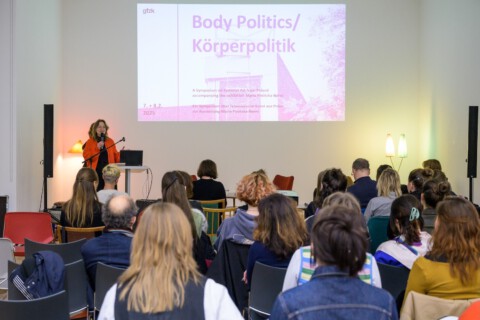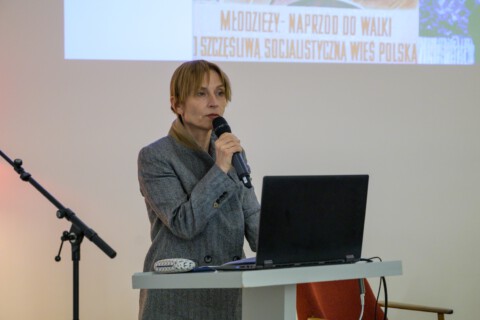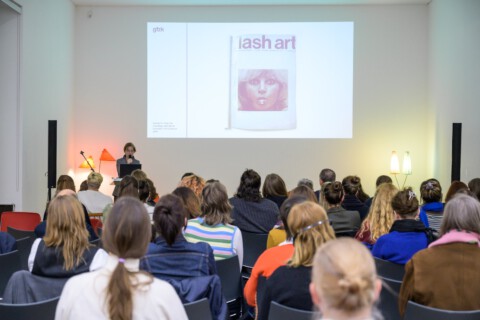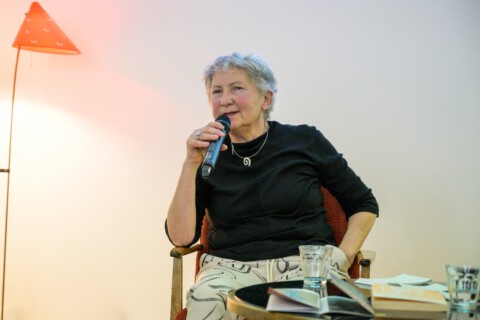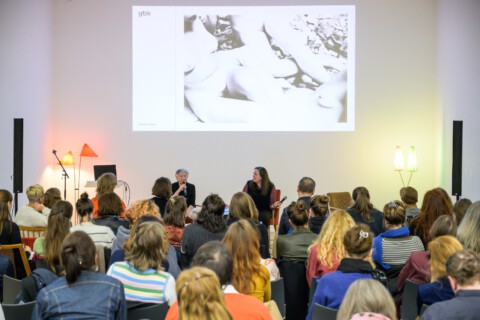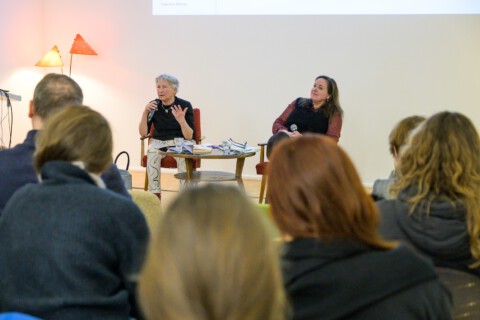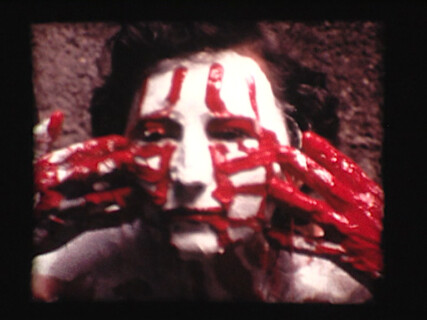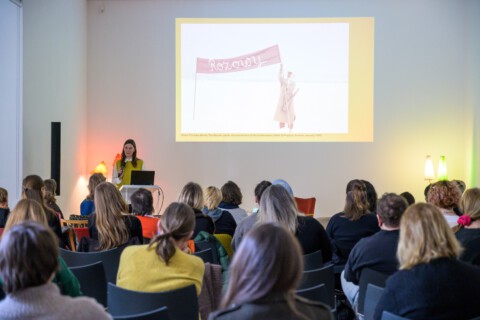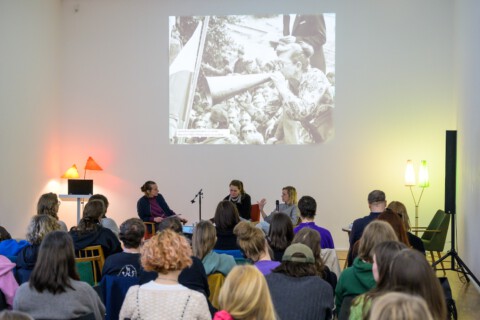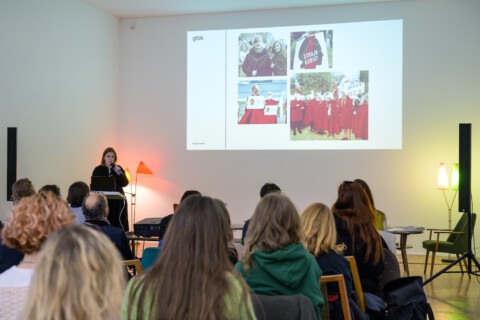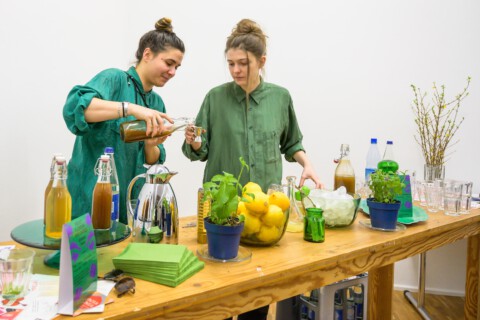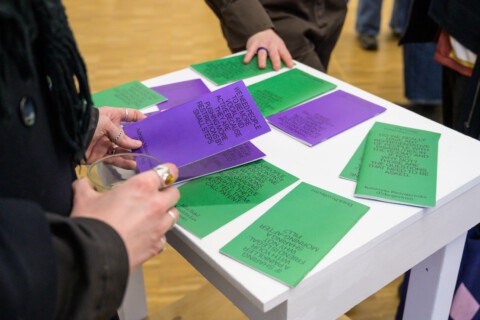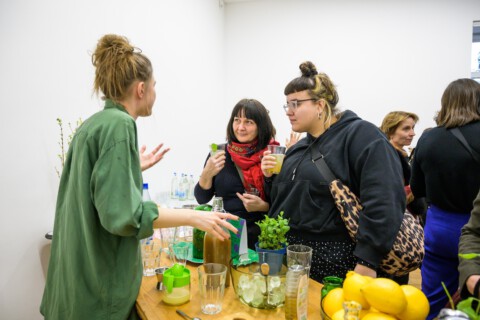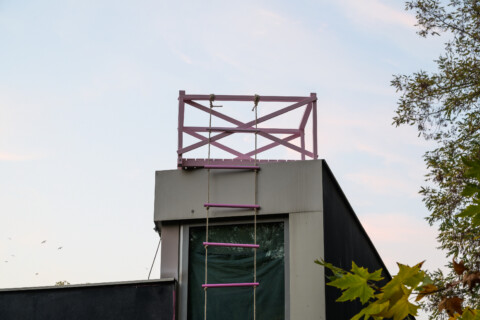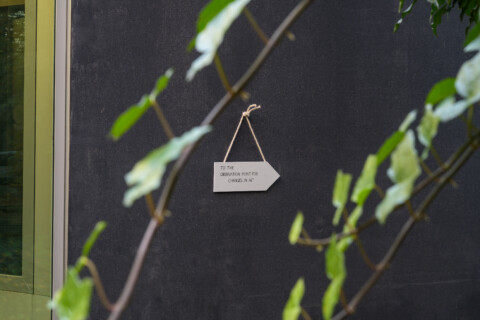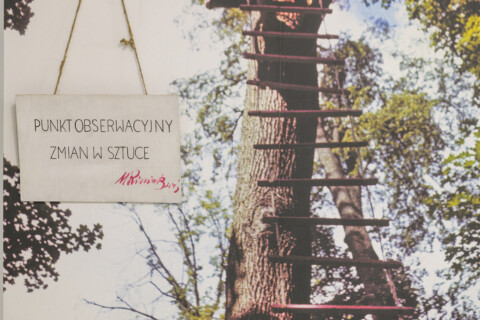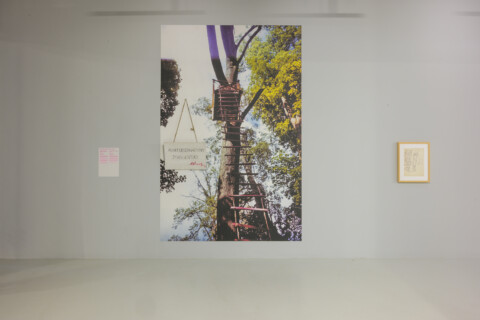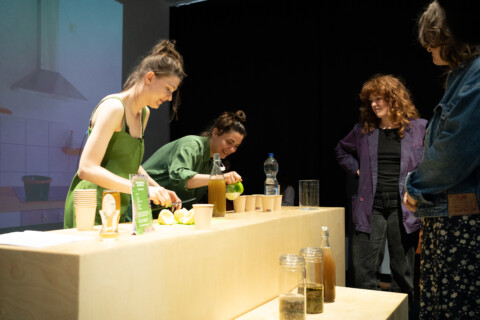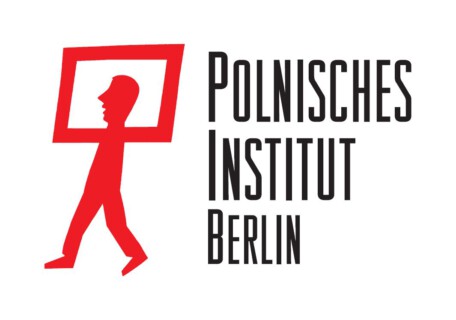7 February, 5 to 7 pm
8 February, 11 am to 6 pm
German and English, students of the Conference Interpreting master’s programme at Leipzig University will provide simultaneous translation of the German contributions into English.
The symposium is fully booked – registrations are no longer possible.
On the occasion of the exhibition Maria Pinińska-Bereś, a two-day symposium with lectures and artistic contributions will be held at the GfZK. The focus will be on the work of Maria Pinińska-Bereś and feminist art in Poland in the 20th century, including aspects such as the significance of performance, the influence of political reality on artistic work in the People’s Republic of Poland and parallels with the situation of women artists in the GDR. Additionally, the symposium will provide insights into the history of reproductive rights, feminist struggles and the queer movement in Poland today and the visual culture associated with it.
The GfZK presents Germany’s first comprehensive solo exhibition of Maria Pinińska-Bereś (1931-1999) curated by Heike Munder and Jarosław Suchan. Pinińska-Bereś created a unique body of work including sculptures, objects, installations and performances. A central element of her poetic and political art is the exploration of femininity and the societal constraints associated with it. Along with colleagues such as Natalia LL or Ewa Partum, Pinińska-Bereś is seen as a pioneer of feminist art in Poland. She positioned herself against the structural violence of both the State and the Church, and critically questioned the art industry from this perspective. The symposium accompanies the exhibition, which can be seen at the GfZK until February 23, 2025.
7 February
5 pm
Welcome & Introduction
5:15 pm
Impulse Iwona Dorota Bigos: On the situation of women artists and feminist art in the People’s Republic of Poland
Iwona Dorota Bigos is an art historian and director of the Museum of Contemporary Art, which is part of the National Museum in Wrocław. The Maria Pinińska-Bereś exhibition was on display there before it came to Leipzig. In her impulse, she presents selected examples to provide insights into the situation of artists in the People’s Republic of Poland before the political change in 1989. (German with translation into English)
5:45 pm
Susanne Altmann and Gabriele Stötzer: … hab ich euch nicht blendend amüsiert? [… didn’t I amuse you brilliantly?] A conversation about feminist art and working as a female artist in the GDR
Gabriele Stötzer is one of the most important German artists in the field of feminist art. Her performances, Super 8 films and photographs – especially those created in the 1980s together with the Erfurt artists’ group in the GDR – have been shown in numerous exhibitions and contextualized in recent publications. Her artistic work was strongly influenced by her experience as a woman and as a victim of political persecution in a repressive, patriarchal system. Susanne Altmann is a researcher and curator. The focus of her research is on the artistic production of women in the former GDR within an Eastern European frame of reference. In her work, she challenges the persistent practice of viewing artistic positions from the perspective of Western art history. (German with translation into English)
Following the discussion, the Super 8 films signale (1989, 28’34”) and … hab ich euch nicht blendend amüsiert? (1989, 6′) will be shown
8 February
11 am
Welcome and introduction
11:20 am
Lecture Agata Jakubowska: Exhibiting Maria Pinińska-Bereś in 1970 and 1980 and the discourse on women’s art in State-Socialist Poland
In this lecture, art historian Agata Jakubowska speaks about two exhibitions – a 1970 solo show by Pinińska-Bereś, and the Women’s Art Festival in which she participated in 1980. Jakubowska shows how the artist’s work and position evolved over this decade, and how the discourse surrounding women’s and feminist art developed in Poland during the same period. (Online, English)
11:50 am
Lecture Dorothé Orczyk: Performance art as female resistance. On the performances of Maria Pinińska-Bereś
For her PhD project on performance art as resistance, Dorothé Orczyk looks into the artistic practice of four female Polish performance artists whose work revolves around the position of women: Natalia LL (1937-2022), Zofia Kulik (1947), Ewa Partum (1945) and Maria Pinińska-Bereś (1931-1999). In this lecture, scholar Dorothé Orczyk provides insights into her current research with a focus on Maria Pinińska-Bereś. (English)
12:20 noon
Dialogic tour of the exhibition Maria Pinińska-Bereś with Heike Munder and Jarosław Suchan
Heike Munder and Jarosław Suchan are the curators of the solo exhibition currently on view at the GfZK, with sculptures, objects and performance documentations by Maria Pinińska-Bereś. In this tour, they discuss the theses and questions that arose from lectures and discussions on the artworks presented. (English)
1:30 pm
Joint lunch at the GfZK Café
2:30 pm
Talk & reading with Magda Wlostowska, Verena Triesethau and Katharina Zimmerhackl from outside the box: Queer and feminist struggles in Poland
outside the box – Zeitschrift für feministische Gesellschaftskritik is a magazine collective founded in Leipzig at the end of 2008. It has published eight issues to date, combining art, theory and practice. The most recent issue, #8, was published in 2023, on the topic of “Struggles”. Together with political scientist Magda Wlostowska, editors Katharina Zimmerhackl and Verena Triesethau explore queer and feminist struggles in Poland. Among other things, they examine the history of reproductive rights and the feminist struggles that surround them, providing insights into the queer movement and the current situation in Poland. From this perspective, they also examine the growth of regressive tendencies worldwide, accompanied by increased struggles for sexual self-determination. They also read and discuss articles from recent issues. (German with translation into English)
3:45 pm
Lecture Karolina Rosiejka: Visual Resistance. The Aesthetic Landscape of Poland’s Black Protests and Women’s Strikes
In this presentation, art historian Karolina Rosiejka examines the visual culture associated with the Black Protests and Women’s Strikes in Poland, movements that have persisted since 2016 in response to legislation restricting women’s abortion rights. The analysis will encompass artistic works, artifacts and visual practices linked to activist efforts. These elements share a common purpose: to critique the condition of Polish women under increasingly restrictive abortion policies, to articulate opposition to this reality and to envision an alternative future beyond the constraints of the prevailing socio-political order. (English)
From 16:30 pm
Performance and get-together with Alexandra Ivanciu and Jolanta Nowaczyk: About Flowers and Choice
The aim of the performance About Flowers and Choice is to initiate a discussion on access to abortion, bridging the gap between former healers and witches and contemporary activists through storytelling and shared experience. The donations gathered during the performance are used to buy morning-after pills, which are donated to collectives and distributed to individuals in countries where access to emergency contraception is restricted. The project represents a call for solidarity and an invitation to take action, providing a hospitable and welcoming space for existing ideas and actions related to reproductive justice. For more information on access to abortion in Central Eastern Europe, visit the Library of Collective Disobedience.
The GfZK Auditorium is located on the first floor of the villa and can be reached via stairs and an elevator. The toilets are located in the basement and can be reached via the staircase and an elevator. One toilet is equipped with plenty of space for a wheelchair and support elements.
BIOS
Susanne Altmann was born in Dresden, where she lives and works as a freelance art historian. After graduating from high school, she became a specialist nurse for anaesthesia. She practiced this profession for ten years, initially parallel to her studies, which she completed in Dresden after the fall of the Berlin Wall and then at the New School for Social Research in New York City. She worked at the Dia Center for the Arts/NYC and conducted research at the University of Oxford. Altmann is concerned with canon formation and the reception of non-conformist avant-gardes, increasingly integrating art created in the GDR into the contexts of global and feminist art histories. In addition to “Medea muckt auf/The Medea Insurrection” (SKD Dresden/L.A., 2018-2020), she has curated exhibitions on the following themes: Discovered. Rebellious Women Artists in the GDR (Kunsthalle Mannheim), Zellinnendruck (Neues Museum, Nuremberg) and was co-curator of “Hosen haben Röcke an/Pants Wear Skirts” (nGbK Berlin 2021/2022). Altmann has been teaching 19th to 21st century German art history in English at the Dresden University of Fine Arts since 2010. As a result of a two-year research commission from the Amsterdam institution If I Can’t Dance, her book “When Technology Was Female” was published in 2024. Her literary translation of the text “valentine” by British artist Monica Ross was also published by Spector Books in 2024.
Iwona Dorota Bigos is an art historian, art curator, and, since 2018, curator and head of the Museum of Contemporary Art — Branch of the National Museum in Wrocław. She was the director and founder of the Gdańsk City Gallery (2009–2015) and director of the Stadtgalerie in Kiel (Germany) in 2017. As well as organising over 20 solo and group exhibitions in Poland and internationally, she is a co-creator of major artistic events in public spaces. She is the author of papers on contemporary art and art curatorial practice.
Alexandra Ivanciu is an artivist based in Leipzig. She grew up in Bucharest, Romania, where access to emergency contraception was highly permissive. In 2013, while living in Poznan, Poland, she needed to buy the morning-after pill. She was not aware that it cannot be bought over the counter in Poland, and tried to purchase it at the last minute without success. Finally, the same evening, two very kind nurses in a small clinic helped her by giving her a prescription without sending her to consult a doctor, which was and still is mandatory. She managed to avoid a pregnancy. Understanding that this is not only her story, she took a step in the activist direction and decided to use her artistic skills to contribute to the fight for reproductive justice. With an art practice informed by intersectional feminism, queer and decolonial theory, Alexandra aims to overcome the boundaries of the art space in order to actively contribute to society’s needs.
Agata Jakubowska is a professor at the Institute of Art History of the University of Warsaw. Author and editor of numerous publications on women’s art. Recently, she published “Horizontal Art History and Beyond. Revisioning Peripheral Critical Practices” (ed. with Magdalena Radomska, Routledge 2022), a monograph on the Polish sculptor Maria Pinińska-Bereś under the title “Art and Emancipation of Women in Socialist Poland. The Case of Maria Pinińska-Bereś” (in Polish, Warsaw University Press, 2022) and an IKONOTHEKA issue entitled “Feminist Art Historiographies in Eastern Europe and Latin America” (33/2023, ed. with Andrea Giunta). Currently, she is researching the transnational history of all-women exhibitions (funded by the Polish National Science Center). Within the framework of this project, she is preparing the book “Real and Imagined Communities in All-Women Exhibitions”.
Heike Munder is an independent curator and writer. She studied Cultural Studies at the Leuphana University in Lüneburg. Together with Jarosław Suchan, she co-curated the retrospective of Maria Pininska Béres for the National Museum Wroclaw (2024), the Galerie für Zeitgenössische Kunst Leipzig (2024/2025) and the Kunstmuseum Den Haag (2025). She was director of the Migros Museum für Gegenwartskunst from 2001 to 2023. She co-founded the Halle für Kunst Lüneburg e. V., which she co-directed from 1995 to 2001. She has curated exhibitions, including retrospectives, major commissions and thematic shows, such as Korakrit Arunanondchai (2022), Stephen Willats (2019), Teresa Burga (2018), Jimmie Durham (2017), “Resistance Performed – Aesthetic Strategies under Repressive Regimes in Latin America” (2015),Dorothy Iannone (2014),Geoffrey Farmer (2013), Ragnar Kjartansson (2012), Tatiana Trouvé (2009), Marc Camille Chaimowicz (2006), Yoko Ono (2005), Heidi Bucher (2004), “Art & Language” (2003) and Cathy Wilkes (2002).
Jolanta Nowaczyk is a Prague-based pro-choice activist and artist. One day in 2017, she received a message from her partner expressing concern that they may have engaged in more unprotected sex than they had realised. Several hours later, he brought her a morning-after pill to her workplace, which she took in the bathroom. She felt dizzy shortly after taking the pill, but was too ashamed to ask for the day off. Despite the situation, she was relieved that the morning-after pill was available over the counter, unlike in her home country, Poland. Years later, she turned this privilege into action by co-creating Ciocia Czesia, a collective that helps people from Poland access legal and safe abortions in the Czech Republic.
Dorothé Orczyk is a curator and a PhD candidate at the University of Amsterdam, working on the curatorial and research project “Performance Art as Female Resistance”. Her project focuses on whether and how performance art was and continues to be used as a form of (political) resistance by Polish female performance artists who began their practice during the Polish People’s Republic (1952-1989) and continued after the fall of the Berlin Wall. Orczyk previously worked as gallery director at Ellen de Bruijne PROJECTS and was co-founder and curator at the exhibition space ROZENSTRAAT – a rose is a rose is a rose in Amsterdam. Her curatorial interests centre on performance art, with a particular focus on socially engaged and feminist art practices.
Karolina Rosiejka is a doctor of humanities in the field of art sciences. Since the academic year 2019/2020 she has been assistant professor at the Faculty of Art Education and Curatorial Studies at Magdalena Abakanowicz University of the Arts in Poznań. She holds an MA in art history from the Interdisciplinary Individualized Studies in the Humanities and Social Sciences programme at the Adam Mickiewicz University in Poznań, where she also earned a degree in history. She later obtained her doctoral degree from the same university. She is interested in the methodology of art history, art in a social context and the relationship between artistic creation and social, political, scientific and critical discourses. A researcher of the presence and activity of women artists in the reality of the art world, she is fascinated by artistic phenomena of the 20th century.
Gabriele Stötzer is a visual artist and writer. In the GDR, she was part of the regime-critical scene in Erfurt. She studied art and German literature from 1973 onwards and was politically exmatriculated in her final year. After the expatriation of Wolf Biermann in 1976, which she had publicly criticized, she was sentenced to a year in the notorious Hoheneck women’s prison. Although she was offered the opportunity to leave the GDR, she stayed and went into the GDR’s artistic underground. Until the end of 1989, the State Security carried out secret operations (Operative Vorgänge) on her with the intention of sending her back to prison or to a psychiatric ward. From 1980 to 1981, she ran the private Galerie im Flur in Erfurt, initiated pleinair gatherings in Eichsfeld and organised a private nude drawing group until 1983, all of which were liquidated by the GDR’s State Security. She published her texts in underground magazines of the Prenzlauer Berg scene. After her release, she ran the private Galerie im Flur in Erfurt from 1979 until it was liquidated by the State Security. From 1981, she created numerous works, including performative photography, Super 8 films and fashion object shows with the Erfurter Künstlerinnengruppe (Erfurt group of female artists). In 1989, Stötzer was one of the initiators of the first occupation of a district administration of the GDR State Security in Erfurt. Her work has been shown in numerous exhibitions, including “Bewußtes Unvermögen – Das Archiv Gabriele Stötzer” at the GfZK Leipzig in 2019, “Hosen haben Röcke an. Künstlerinnengruppe Erfurt 1984–1994” in 2022 at the nGbK in Berlin and “Auslöschung eines Blicks. Ich trage meine Wunden offen” in 2024 at Kunsthaus Erfurt. After the German unification she published several books. Together with the author and publisher Anne König, she published the book “Der lange Arm der Stasi. Die Kunstszene der 1960er, 1970er und 1980er in Erfurt – ein Bericht“ (Spector Books).
Jarosław Suchan, PhD, art historian, writer, curator, lecturer at the Jagiellonian University, Krakow. Together with Heike Munder, he co-curated the retrospective of Maria Pininska Béres for the National Museum Wroclaw (2024), the Galerie für Zeitgenössische Kunst Leipzig (2024/2025) and the Kunstmuseum Den Haag (2025). In the years 2006-2022 director of the Muzeum Sztuki in Łódź. Curator of many exhibitions of modern and contemporary art, presented among others at the Centre Pompidou in Paris, Museo Reina Sofia in Madrid, Fundação Serralves in Porto, Gemeentemuseum in The Hague, Universalmuseum Joanneum in Graz, Moderna Museet in Malmö, Zachęta Gallery in Warsaw. Author of numerous texts on the avant-garde, modernism, contemporary art and museology; editor of monographs on the work of Władysław Strzemiński and Katarzyna Kobro, Tadeusz Kantor, the Polish-Jewish avant-garde and avant-garde museology.
Verena Triesethau works as an author and lecturer on the topics of philosophy of the body, feminist body phenomenology and gender theory. Since 2008, she has been editor of the journal outside the box – Zeitschrift für feministische Gesellschaftskritik.
Magda Wlostowska is a political scientist with a focus on social transformation processes in Central and Eastern Europe and gender studies. In recent years, she has published academic and journalistic articles on these topics, including in the weekly newspaper Jungle World. She has also worked as a Polish language translator for many years. In her dissertation, she uses archive material to examine the politicization processes that have accompanied the emergence of queer movements in Poland since the 1980s. The book will be published by transcript Verlag in summer 2025.
Katharina Zimmerhackl, born in Palo Alto/USA, is an artist, designer and author. Her practice moves between sound art, installation, performance and graphics/drawing, with an emphasis on working with language. The thematic focus is on the exploration of different forms of knowledge, their historical production and political significance. In her work, she appropriates scientific, literary and archive materials and processes them into scripts or scores that focus on the body and voice and are realized as performances, sound pieces or sound installations. Since 2010, she has been a member of the editorial board of outside the box – Zeitschrift für feministische Gesellschaftskritik (magazine for feminist social criticism).
